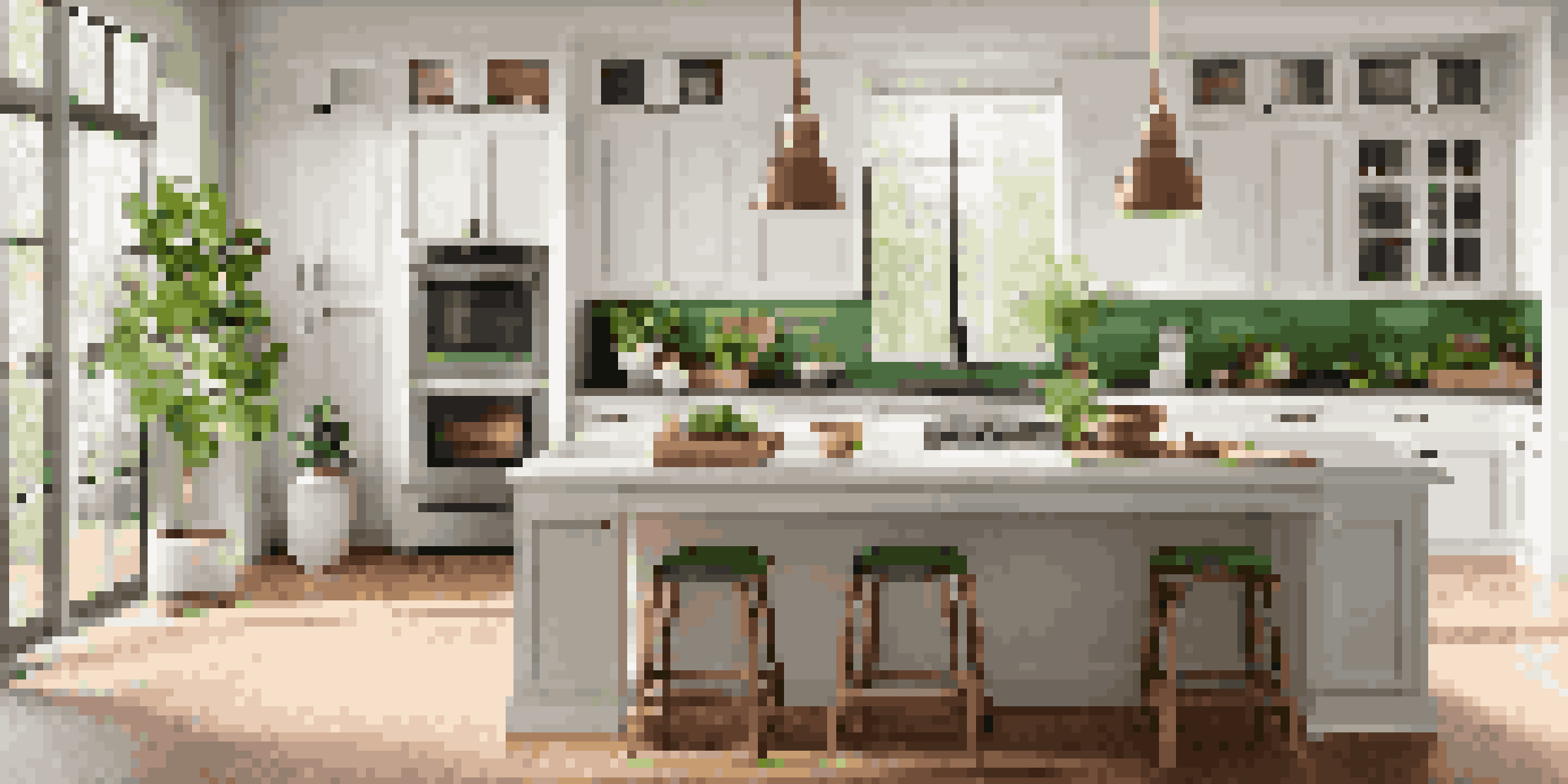The Impact of Quality Renovations on Home Resale Value ROI

Understanding ROI in Home Renovations
Return on Investment (ROI) in home renovations refers to the percentage of the money you gain back when selling your home after improvements. For instance, if you spend $20,000 on a kitchen remodel and sell your home for $30,000 more, your ROI is 150%. Knowing how to calculate ROI helps homeowners decide where to invest their renovation dollars most effectively.
Home improvement is a great way to increase the value of your home, but it’s important to choose projects wisely to ensure a good return on investment.
When considering renovations, it’s crucial to evaluate which projects will yield the best returns. Generally, projects that enhance curb appeal or improve functionality, such as kitchen upgrades or bathroom remodels, tend to offer higher ROI. By focusing on these areas, you can significantly boost your home's resale value.
Moreover, understanding the local real estate market can guide your renovation choices. For example, in a neighborhood where modern kitchens are in demand, investing in a quality renovation could set your property apart from others, making it more attractive to potential buyers.
The Importance of Quality Over Quantity
When it comes to renovations, quality matters more than sheer volume. A well-executed bathroom remodel can add significant value, while a hastily done renovation might not recoup costs. Buyers are often willing to pay more for a home that feels well cared for and has high-quality finishes.

Think of it this way: a beautifully updated kitchen with premium appliances could resonate more with buyers than several mediocre renovations throughout the house. Quality improvements tend to leave a lasting impression, making it easier for potential buyers to envision themselves living in the space.
Maximize ROI with Smart Renovations
Investing in high-impact projects like kitchen and bathroom upgrades can significantly boost your home's resale value.
Additionally, high-quality renovations often require fewer repairs in the long run. This means that not only do you recoup your investment when selling, but you may also enjoy lower maintenance costs while living in your home before the sale.
Popular Renovation Projects for High ROI
Certain renovation projects consistently show high returns. According to industry reports, kitchen remodels, bathroom upgrades, and adding outdoor living spaces are among the top ways to enhance your home’s value. For example, even a minor kitchen remodel can yield an ROI of over 80% in many markets.
Quality is not an act, it is a habit.
Another popular project is enhancing curb appeal with landscaping or a new front door. First impressions matter, and an inviting exterior can increase buyer interest, often leading to a quicker sale at a higher price. It's amazing how a little paint and some flowers can make a big difference!
Investing in energy-efficient upgrades, like new windows or insulation, can also appeal to buyers looking to save on utility bills. These renovations not only boost your home's value but can also be a major selling point in today's eco-conscious market.
Timing Your Renovations for Maximum Impact
The timing of your renovations can significantly influence your ROI. For instance, completing renovations before the peak selling season, typically spring and summer, can maximize your home's visibility and appeal. Homes that are move-in ready tend to attract more buyers during this period.
Moreover, understanding local market trends is essential. If you know that your neighborhood is experiencing growth, investing in renovations before selling can capitalize on rising property values. Conversely, if the market is slowing, it may be wise to hold off on major renovations until conditions improve.
Focus on Quality Over Quantity
High-quality renovations leave a lasting impression on buyers, making it easier to recoup your investment.
Lastly, consider the economic climate. Interest rates, housing demand, and buyer preferences can all shift over time. Staying informed about these factors will help you determine the best time to make renovations that will pay off when you’re ready to sell.
Avoiding Costly Renovation Mistakes
While renovations can boost your ROI, mistakes can lead to decreased value. Over-improving your home for the neighborhood is a common pitfall. If your home becomes the most expensive in the area due to extensive renovations, potential buyers may be deterred, believing they can’t afford it.
It's also essential to avoid DIY projects beyond your skill level. While DIY can save money, poorly executed renovations can lead to costly repairs later. Hiring professionals for complex tasks ensures quality work, which is crucial for maintaining your home's value.
Finally, neglecting necessary repairs before renovations can backfire. If foundational issues or outdated electrical systems aren’t addressed, buyers may be hesitant to invest in a home that requires more than just cosmetic upgrades.
The Role of Trends in Renovation Decisions
Trends in home design and buyer preferences can greatly influence renovation decisions. For example, open floor plans and energy-efficient appliances have become increasingly popular, making them smart investments for home sellers. Staying updated on these trends can help you make informed renovation choices.
Social media platforms and home improvement shows can also shape what buyers expect in a home. If certain features, like smart home technology or sustainable materials, are trending, incorporating them into your renovations can boost appeal and potentially increase resale value.
Timing and Trends Matter
Renovating at the right time and aligning with current market trends can enhance your property's appeal and value.
However, it's crucial to strike a balance between trendy renovations and timeless design. While it’s great to be current, overly trendy choices can quickly become outdated, which might deter future buyers who prefer a more classic aesthetic.
Evaluating Your Renovation's Impact on Resale Value
After completing renovations, it’s essential to evaluate their impact on your home's resale value. One way to do this is by comparing your property to similar homes in your area. If your home stands out due to quality renovations, it’s likely to command a higher price.
Additionally, working with a real estate agent can provide insights into how your renovations may affect pricing. They can give you a comparative market analysis, helping you understand the potential return on your investment based on recent sales in your neighborhood.

Finally, collecting feedback from potential buyers during open houses can offer valuable insights. If multiple buyers express interest in your renovations, it’s a good sign that you’ve made smart choices that could translate into a higher sale price.